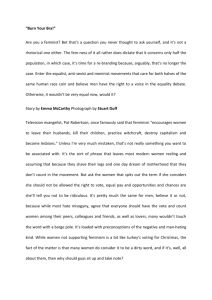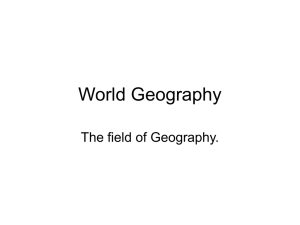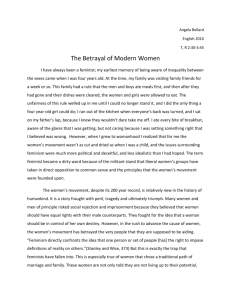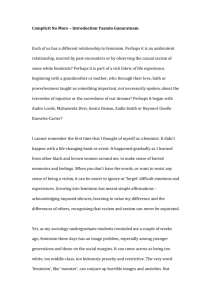Geography and gender or the gender of geography?
advertisement
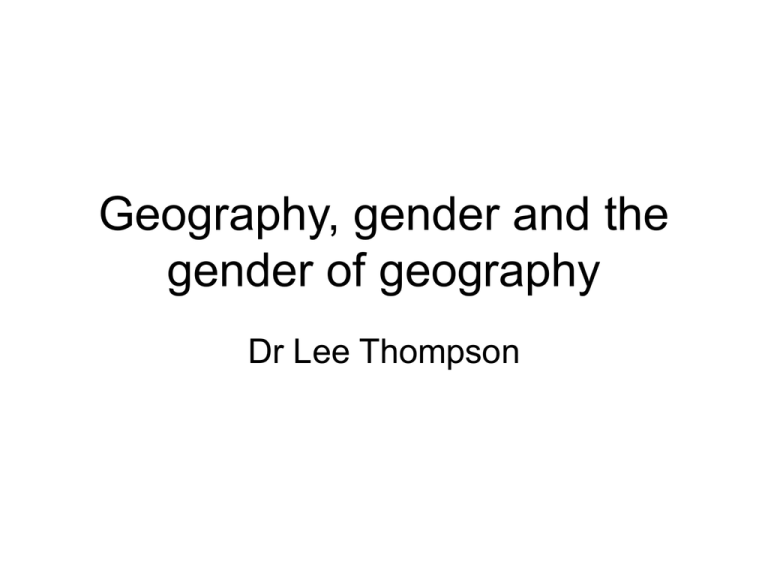
Geography, gender and the gender of geography Dr Lee Thompson Overview • The gender of geography – challenging the single perspective • Different approaches to gender –reflect shifts in social theoretical thinking • Examples of geographical research that pays specific attention to gender Gender • Gender does not only ‘belong’ to women • Gender is socially constructed – rather than inherent • “One is not born a woman, one becomes one” (Simone de Beauvoir, 1972: 525) • Gender makes a difference The gender challenges to/in geography • Unequal experiences and opportunities for men and women in geography and the masculinity of geography, 1970s-1990s – Women overwhelmingly positioned at lower scales – Experience of white middle class men seen as norm Feminist theories • How we think about gender in/and geography – influenced by shifts in feminist thought – Radical feminism – Liberal feminism – Post-structural feminism Radical feminism • Women oppressed as women by men • Replacement of motherhood via reproductive technology – motherhood free from patriarchal control • Radical lesbian feminist separatism alternative to patriarchal system Liberal feminism • All individuals equal in the eyes of the law – should have equal access to the rights of citizenship (emancipation of slaves and women’s suffrage) – Right for married women to own property – Claims for equality in the workplace – Equality the focus Post-structural feminism • Emphasis on difference • No longer searching for ‘the’ grand theory • More focus on equity rather than equality – Notion of equality based on an individual who is a bourgeois man – Claims for equal rights in the workplace fail to take account of women’s particular needs (or increasingly men’s) What counts as knowledge and how do we produce it? • Core challenge from gender theorists – Knowledge is not out there waiting to be found or revealed – we actively participate in producing what counts as knowledge – Multiple ways of knowing – Knowledge production is never value-free or unbiased Situated knowledge – All knowledge is positioned or situated – it comes from somewhere – Objectivity – researchers make decisions about research questions, data gathering, analysis and writing – Individual perspectives influence which types of knowledge we privilege Feminist research • Upsurge of qualitative methods • Focus on power relations between researcher and researched • Concerns with interpretative authority • Ownership of research Gender and monuments Rolleston Statue Robert Falcon Scott Godley Statue Kate Sheppard Captain Cook Masculinities • Masculinity as subject/object of investigation – Historical factors – Embedded representations – Objects and activities – Race, class and ethnicity Masculine branding • What kind of masculinity is being represented in the advertisements? • Are there any traces of femininity evident in them? • In what ways is identity being linked to place in them? • (From Le Heron et al. 1999 Chapter 6 “Gendering Place” in Explorations in Human Geography) Rural Health Care • “My fear is that they will go out there and start practicing independently, not fully trained or supported, and that would be an absolute disaster” • “I’m sick of being seen as a stop-gap” • Gender, power, professional status Gender and development • Gender, work and single motherhood in postrevoluntionary Nicaragua • Male passivity and female activity • Single motherhood viable • ‘Good’ mothering – providing financially as well as providing care for children



